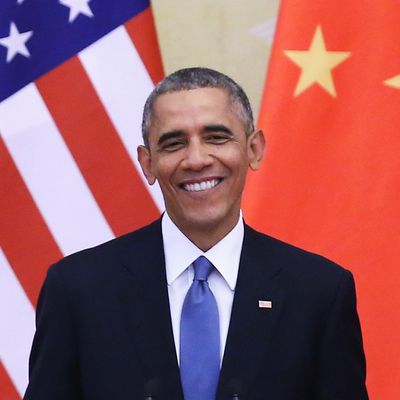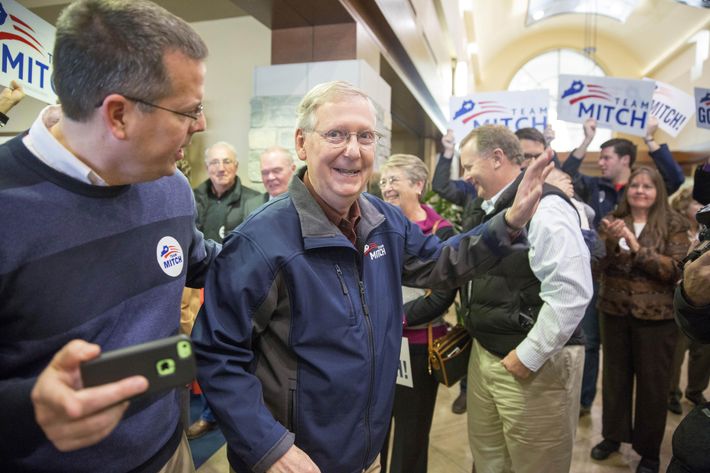
In June, after the Obama administration had announced its Clean Power Plan, The Wall Street Journal editorial page mocked its ambition by explaining what has become a vital tenet of right-wing dogma: limiting our carbon emissions would serve no purpose, since other countries in general, and China in particular, would never agree to limit theirs. “Mr. Obama’s logic seems to be that the U.S. should first set a moral example by imposing costs that reduce our prosperity,” sneered the Journal’s editors, “This will then inspire China (8.7 billion tons), which produces and consumes nearly as much coal as the rest of the world combined, to do the same to its 300 million people who still live on pennies a day. Good luck persuading Xi Jinping.”
Guess what? They seem to have persuaded Xi Jinping.
In a surprise announcement, the United States and China, which combine to produce nearly half of the world’s greenhouse gas emissions, struck a deal to reduce their emissions. The U.S., which has already pledged to reduce its emissions by 17 percent below 2005 levels by 2020, now promises to reduce them by 26 to 28 percent by 2025. China promises to cap its emissions by no later than 2030 and to produce one- fifth of its energy from zero-emissions sources by then.
It is obviously far from a settled fact that China will actually fulfill its commitments. (Or, for that matter, that the United States will — a Republican president in 2017 could, and probably would, bring American emissions reductions to a screeching halt.) At the same time, people who closely study Chinese politics report that it has well-considered internal reasons for reducing carbon pollution, not even considering the general interest it shares with the rest of humanity in mitigating a global calamity. Michael Levi of the Council on Foreign Relations, who has previously expressed skepticism, offers guarded optimism on China’s new promises.
The Republican Party and its intellectual allies regard close analysis of Chinese internal motivations as a useless exercise. Conservatives oppose taxes or regulations limiting greenhouse gas emissions, therefore they dismiss scientific conclusions that would justify such regulations, and therefore they also dismiss geopolitical analyses that would have the same effect. On the right, it is simply an a priori truth that nothing could persuade China to limit its emission. Obviously, the feasibility of a deal with China is far less certain than the scientific consensus undergirding anthropogenic global warming. What is parallel between the two is the certainty of conservative skepticism and imperviousness to contrary evidence.
Over the last several years, as open advocacy of scientific denial has grown somewhat less fashionable, conservatives have leaned more heavily on their premise that Chinese emissions are immutable. As Marco Rubio has argued, “What I disagree with is the notion if we pass cap and trade, for example, this will stop this from happening, when in fact half of the new emissions on the planet are coming from developing countries and half of that is coming from one country, China, that isn’t going to follow whatever laws we pass.” Many, many other Republicans have echoed this refrain.
The implication of this criticism is that if it were possible to persuade China to reduce its emissions, then some kind of reciprocal commitment by the U.S. would make sense. As Charles Krauthammer put it earlier this year:
We don’t control the emissions of the other 96 percent of humanity, especially China and India. As we dismantle the coal plants in our country, China and India together are adding one coal-fired plant every week. The net effect is to shift the U.S. coal energy generating industry from here to India and China. It will have zero effect.
If we could have a pact with other countries in which everybody would reduce their emissions, I would sign on. In the absence of it, all that we’re doing is committing economic suicide in the name of do-goodism that will not do an iota of good.

It would be nice to think that evidence like today’s pact would at least soften the GOP’s unyielding certainty about the absolute impossibility of a global climate accord. The near-total refusal of the right to reconsider its denial of the theory of anthropogenic global warming sadly suggests otherwise. James Inhofe, the incoming chairman of the Senate Environment and Public Works Committee and a fervent climate science skeptic, has quickly dismissed the deal as a “hollow and not believable” and a “non-binding charade.”
Mitch McConnell adds his own diplomatic insight. “As I read the agreement, it requires the Chinese to do nothing at all for 16 years.” That is an extremely ignorant way to read the agreement. The apparent basis for his belief is that China’s highly ambitious targets apply in 2030, so McConnell seems to believe China can do nothing until then, and perhaps pull a huge New Year’s Eve 2030 all-nighter frantically replacing thousands of coal plants with nuclear and solar. If McConnell reads the agreement more carefully, or even consults with people who understand how environmental accords work, he might realize that other countries have ways of tracking your progress and calculating whether you’re on track to meet a future emissions target. More likely he would just come up with a different soundbite to justify his position.






























